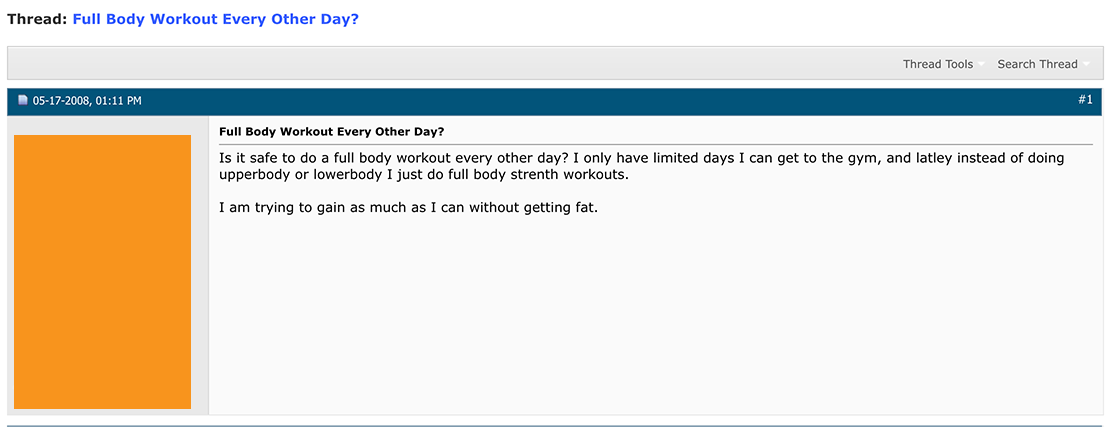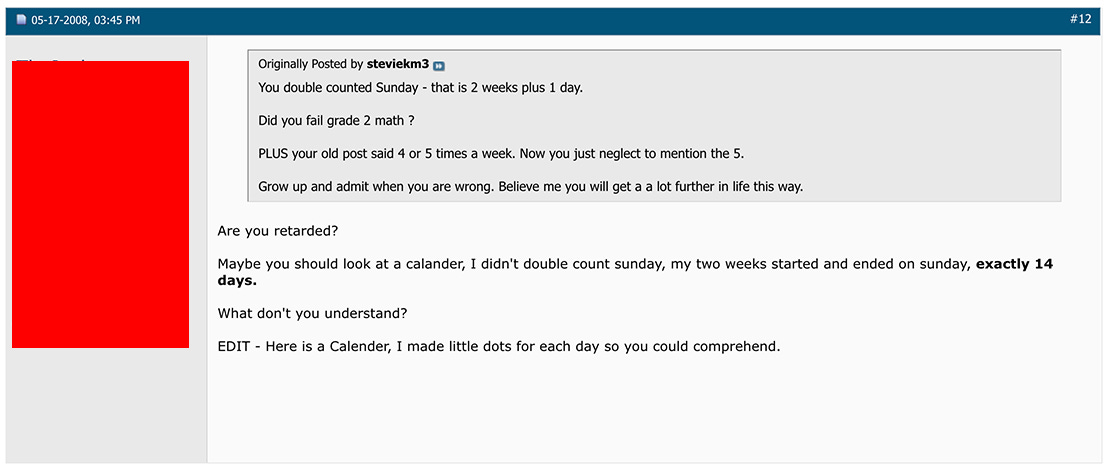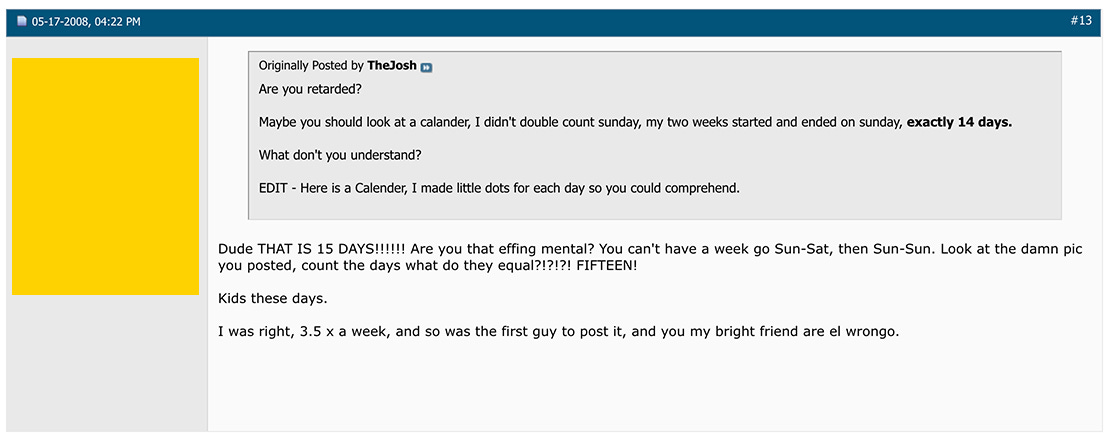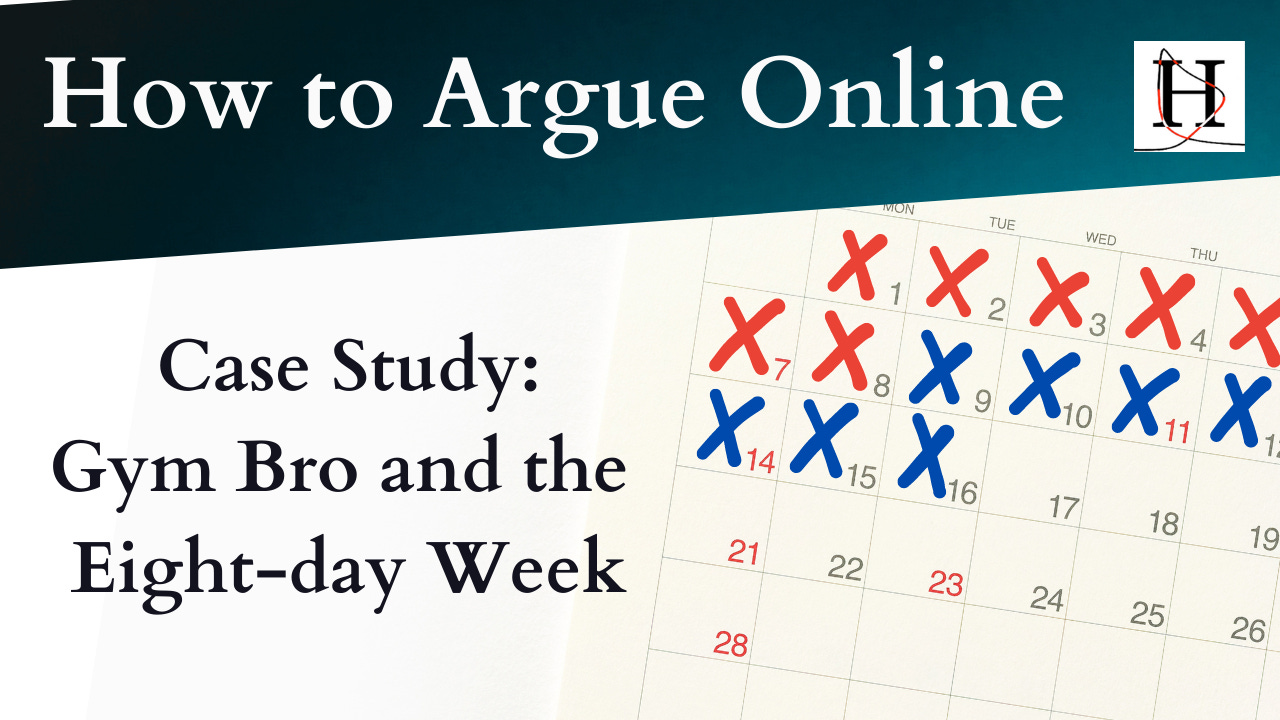Case Study: Gym Bro and the Eight-Day Week
This infamous exchange shows why online disagreements are so frustrating
If you’re anything like me, you probably find it painful to watch the way people talk to each other online when they disagree about something important. The strawmanning, the doubling down, the refusing to listen, the mud-slinging, the well-poisoning—very, very precious few of the arguments made on the internet would hold up in a well-mannered exchange of ideas.
But this isn’t a dunk blog. We’re not here to wallow in smug self-satisfaction while we laugh at how stupid the other people are. We’re here to acknowledge we might have made some of these mistakes ourselves, and it’s easier to learn when we’re not the ones in the hot seat.
So let’s revisit some famous online exchanges and see what we can learn about fostering productive discussion. What happened? Why? How could it have gone differently?
Let’s dive in.
The Scene
When Orange here posed this innocuous question to Bodybuilding.com’s forums, they had no idea they were about to make internet history:

This is a great question to ask on a bodybuilding forum! They’re in the right spot, they’re receptive to new information, and despite their self-image issues, none of what they’ve said is insulting.
So far, great.
An experienced powerlifter answers their question.

Again—fantastic! Short and to the point. Didn’t need the scare quotes but whatever. Cheers all around.
End of thread.
Oh, wait.

Oh, oh no.
From here on out, Orange has made a fatal mistake. They were wrong on the internet.
The Beginning
When someone makes a mistake on the internet, and another person notices, the first choice they make is whether to respond.
In a case like this, online or off, I ask myself four questions:
Am I sure this is a mistake?
Would it be helpful for anyone to see the mistake corrected?
How is this person likely to react to being corrected?
Do I want to respond to this person?
Note the personal ‘I’ here, because I want to make it very clear that this is a personal approach, and I’m not presenting it here as The Only Solution. This isn’t prescriptive. It’s just a framework.
I’ll discuss the purpose of and theory behind these questions in a different essay. For now, let’s just see how they apply here.
Am I sure this is a mistake?
On its face, yeah. A full body routine every other day would mean working out 3 or 4 days a week, alternating; 3.5 on average. But there might be some other source of information Orange is drawing from that we don’t have access to. Orange might have misread the source of their exercise program. For example, a program that describes itself as “every other day during the working week, but every day on weekends” could be 4 or 5 times a day.Would it be helpful for anyone to see the mistake corrected?
Would Orange find this helpful? Maybe. They were concerned about whether doing a workout every other day was too much exercise. So if they overcounted, knowing the routine is either 3 or 4 days a week, alternating, would put their concerns to rest.
Would other people find this helpful? Probably not. This might have been a typo, it’s not directly related to the question Orange asked, and most people know how weeks work.
I mean, I hope they do.How is this person likely to react to being corrected?
Okay, this one needs a bit of background. When someone makes a mistake publicly and gets corrected, they have a higher emotional processing load than everyone else. They have to both deal with the embarassment of being called out and, at the same time, try to evaluate what the other person is saying. But there’s some situational variation in how people respond to this emotional challenge. Depending on the person, they might be more receptive to a friendly message from someone with genuine good intentions, or they might be sensitive to criticism no matter what.
The ideal response would be to thank the responder and focus on the information being presented, and allow themselves to process their emotions alone. This is almost never what happens.
Silence is a positive response: processing emotions and changing their mind are both things that an indivudual does on their own, rather than in a dialogue. Silence is a good indicator that the person is doing one of those things. Lashing out, though, shows that the person is too deeply offended or preoccupied with their emotional state to take in new information.
Orange came here to learn, and is being receptive to the answers more experienced people have presented. Based on that, I’d expect Orange not to respond to this type of correction. Which is great! This thread is over anyway.Do I want to respond to this person?
Not particularly. I got better things to do.
So, reflecting on the exchange, I’d probably say nothing here. Or, if I said something at all, the response would be short and sweet, non-confrontational, and focused around the benefits to Orange. Something like:
I’m not sure where the 4–5 day estimate came from. Working out every other day would correspond to 3 or 4 days a week, alternating. That seems doable, right?
The Kerfuffle
As you may have guessed, that is not what happened.
It started out fine at first. The helpful experienced bodybuilder, Purple above, responds with this neutral and supportive response. It’s low-key a gentle correction that is also wrong, but whatever, the stakes are minimal here so it doesn’t matter; no need to ‘ackshelly’ this guy.

Another commenter jumps in with more helpful advice. Then, someone takes the bait:

On its face, to the casual reader, this is fine. It comes close to my suggested response. There’s no mention of the benefit to Orange for understanding the difference, and no ‘I’ language, but it focuses on informational content and avoids insults. But there’s a slight weakness to the way this commenter worded this information, and because this is the internet, anything anyone interprets as a mistake must be punished harshly and immediately.
Do you see it?
He meant “3.5 times a week, on average,” but he didn’t say “on average!”
So now Mr. Red here has to jump in to point out he didn’t say the magic word.

I’ll spare the details of going into Red’s reasoning about this workout program. Instead, we’ll focus on reading Red’s comment to gain insight to his mental state and how he’ll likely respond to being corrected.
(By the way, you may have noticed that I’ve covered profiles with color, but haven’t bothered to censor out names in the replies. The commenters’ usernames are also fully visible on the linked site. This is a stylistic choice so that if any of the people whose interactions we analyze ever make it to this site, they see the analysis being applied to colors instead of their usernames. Hopefully, this makes it less personal and softens the blow.)
(Also, and this is important: based on demographic information, Red’s participation in the conversation, and when Red’s account was created, Orange and Red are likely the same person changing accounts. If you like, you can interpret the color gradation as them going up a notch in aggression.)
If we look at the framing, Red has asked a question. “How do you go 3.5 times?” This could be an honest request for clarification in response to a comment he didn’t understand. But it’s not, because he immediately follows it up with “Do a half workout or something? lol.”
What this dismissive response does is, it shows us how Red responds to another user when they say something he doesn’t expect. He immediately assumes the other person is wrong, and rather than asking a question to clear up the discrepancy, is belittling. It could be that he reacts differently in other contexts. But something about this interaction presented a challenge to the way he sees himself. It could be that he saw making an arithmetic mistake as a challenge to his intelligence or critical thinking skills, which are important to him. So we have to update our knowledge about his mental state: he’s taking this interaction personally.
From a couple short sentences, we can assume Red will meet any disagreement by refusing to take in new information and lashing out. The question now becomes, for any person involved, is the benefit to responding to and addressing the conflict higher than the stress of having to deal with an argumentative user?
At least one person thought so.
Unfortunately, and perhaps this is because they’re posting anonymously on a bodybuilding forum and the stakes are supposed to be low, Yellow dug Red deeper into his defensive mindset with one word: “genius.”
We have some evidence already that Red responds to things he doesn’t understand by not only assuming the other person is wrong, but mocking them. Even though we can’t directly see what’s in Red’s head, his prior reaction suggests something about the way Red processes information and his priorities, and knowing this helps us unpack what comes later. So let’s unpack.
We know that Red’s immediate reaction to a statement he doesn’t understand is not to ask a question and wait for clarification, but to assume the other person made a mistake. An assumption that if he doesn’t get it, it must be wrong. This suggests, in the context of this interaction, that Red is evaluating the quality of responses not on the content, but who said it. We expect that no matter how well someone picks their words, no matter how gentle they are, if it’s not what Red thinks, he is not going to evaluate the comment on its own merits. This strategy for processing information is going to make continuing the conversation harder for him.
The other point is, in this context, being seen as more competent than someone Red disagrees with is emotionally important to him. It’s possible for someone to assume they’re right without also needing to put down those who disagree. But Red went out of his way to mock the other user. This belittling is meant to signal intellectual dominance, complete confidence in one’s own position, and distrust in the other person’s ability to process and convey information.
It’s easy, then, to predict how Red will respond to having his intelligence insulted. He’s going to get defensive and double down. He wants to be seen as smarter than people who say things he doesn’t understand, and someone else just challenged that. Aggressively, too, with a direct insult.
And hoo boy, does he double down.

Again, Red could be fine in other contexts and is just temporarily responding to what he interprets as a blow to his ego. It does suck, having your arithmetic corrected in a public forum. The important part is being able to look back and analyze the interaction to strategize on how it could have gone differently.
Do I think this could have been prevented? Absolutely. No matter how hurt Red felt, no matter whether he was wrong about a minor thing, it takes at least two people to have a discussion. And once other people saw that insulting Red’s intelligence was riling him up, they could predict that if they kept responding to him in the same way, he’d keep up that pattern of behavior.
So people kept belittling his intelligence.

And he kept fighting back.

And they kept insulting him.

And he kept insulting them back.
The rest of the thread is much the same: more emphasis on hurling poo than on listening and evaluating.
For a math educator, this is painful to read. Not because someone made a simple arithmetic mistake, but because the focus of the discussion is not on resolving the mistake at all. It’s because everyone involved, regardless of whether they’re right or wrong, is in attack mode. And that’s not going to motivate anyone to learn. If you try to teach a kid times tables by screaming at them and calling them stupid every time they get something wrong, it discourages them from trying.
I would have stopped responding after Red’s first “lol.” Red has indicated that he doesn’t want to consider the possibility he made a mistake, at least not in this forum. No one can make him listen. So if our ultimate goal is to facilitate the productive exchange of information, the best thing to do is not interact here, and encourage others to not interact. Being accused of making an arithmetic error on a public forum can be stressful, regardless of whether the person was right or wrong. It takes time and reflection to recover from. It is not going to be helped by engaging with the forum further, because the back-and-forth prevents Red from having alone time to reflect on these things.
I suspect I’m not the only person to have noticed this. But if everyone who cares ducks out, the only people remaining are the ones who can’t tell when someone is not receptive to correction, or who have some other motivation, such as feeling superior for having pointed out someone else’s mistake. That leads to low-quality discussion.
There’s more to address here. We’ll save those things for a future writeup. For now, let the beginning represent one of the lowest-hanging fruits of online discussion strategy: if you insult someone, they will not be receptive to what you are saying. Of course! Insults draw attention away from the content being presented and force people to process their emotions—a process which is more effective when they’re removed from the conflict situation—and engage in discussion at the same time.
Is there a way to steer the exchange away from this point? Yes. Yes there is. You can positively model behavior that encourages productive discussion. But that’s a topic for an entire blog, and that’s enough for today.







